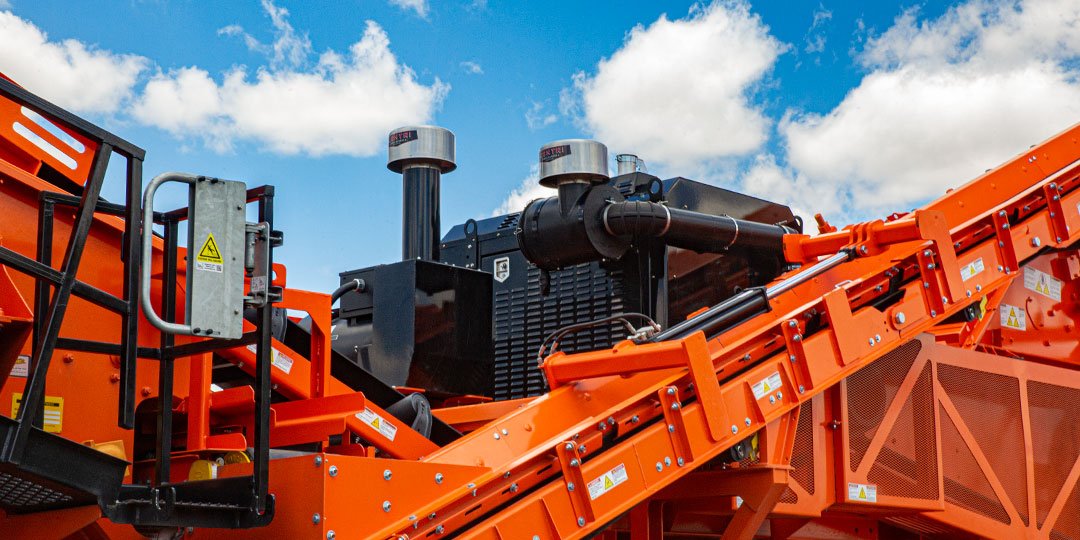What’s Powering Your Portable Plants This Year: Diesel or Electric?

Portable crushing plants are powerful machines with many moving parts that rely on diesel or electric power to operate. Historically, diesel power has long fueled the crushing industry, but lately, electric power is rapidly becoming popular, even when plants move from jobsite to jobsite.
When it comes to crushing material like aggregate, concrete, and asphalt, what are the benefits between using diesel and electric power to run a portable plant’s impactor, conveyors, and other components?

Crushing and screening plants generally have three options when it comes to how the equipment is powered: diesel, electric generator, or line power.
Diesel power typically refers to a diesel engine and electrical generator onboard the crusher itself. The diesel engine supplies mechanical energy to run the crusher while also powering the electric generator in order to run the conveyors, magnets, screens, and other components.
Diesel engines are the most compact choice as they typically require no additional items to be transported since they are installed on the plant itself. However, with the engine being on the plant, they are exposed to all the vibration and dust a plant may produce while crushing, possibly affecting uptime due to hoses that may shake lose, or air filters that may get clogged more frequently.
Another option is the electrical genset-powered plant. This option uses an off-board diesel generator to provide direct electrical power to the plant as well as using an electric motor to drive the crusher.
Genset-powered plants can provide some benefits over direct diesel plants. Because the diesel engine of the genset is removed from the plant, it is isolated from the vibration and much of the dust, allowing the generator to likely see fewer issues than a diesel mounted on the plant itself. Also, electric motors are generally more reliable in the long term given their simpler construction.
Yet, gensets do have some downsides that must be factored in. The biggest issue is that an additional piece of equipment, the genset, must always be brought along to each job site, increasing transportation costs. Also, even though the plant is electrically powered, the genset will still require diesel, meaning fuel costs will remain.
Finally, operators can choose line power to run their plants. This option directly connects the plant to the power grid and removes diesel and genset from the equation. Line power will generally be the cheapest, since it is not subject to fluctuations in fuel costs and will have minimal to no maintenance concerns since there are no moving parts to it, aside from the electric motors.
However, there are some major disadvantages to line power to be concerned with. First, if not already prepared at a job site, installation of utility hookups at the scale required to power a crusher can take months of planning and can easily run into the six figures.
Also, while diesel and genset options can be hampered by issues onsite, line power can be susceptible to issues offsite as well, like a car crashing into a utility pole 20 miles away knocking out power to your operation.
Finally, by connecting to line power, moving the plant to another site is more difficult. Not only will the power have to be disconnected, a genset will have to be acquired to run the plant offsite, if the new site is not also prepared with line power hookups.
Like with many decisions for a crushing job, the choice between diesel and electric power for your portable plant will likely depend on the nature of the project, so it is especially important to consider the advantages of each.
For additional information about the benefits of diesel and electric power sources for portable plants, we invite you to contact our sales department to speak with a Team Eagle representative.
Serious Projects Demand Eagle Crusher.
Eagle Crusher consistently leads the industry in new product innovations. We stand by our products with unsurpassed service and support to make your job easier.
Get serious. Get Eagle Crusher.
• Durability and longevity
• 24-hour parts and service
• American made
• Highest productivity and profits
• High resale value
• Celebrating 100+ years of service


